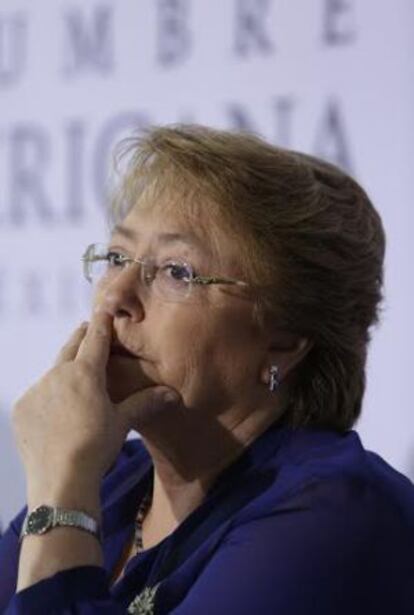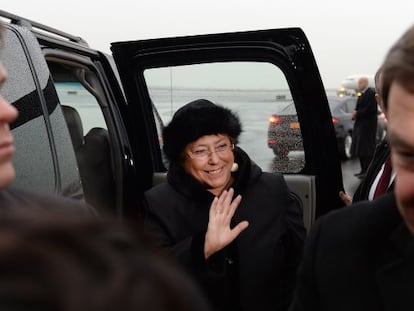Chile’s Bachelet battered by son’s questionable real estate dealings
Government officials have failed to contain the scandal, which has hit the president hard


When a political scandal directly hits a head of state such as Chilean President Michelle Bachelet – who until recently enjoyed fierce popularity and an impeccable reputation – a government is suddenly caught off guard.
Since stories broke in the Chilean press in early February about an alleged million-dollar real estate transaction involving Bachelet’s son and daughter-in-law, the La Moneda presidential palace has not been able to control the damage.
The president’s political agenda has come unraveled just one year after she assumed her second term in office and, above all, her election pledge to fight inequality has been badly eroded.
Prosecutors are looking into whether the president’s son, Sebastián Dávalos, and his wife, Natalia Compagnon, obtained privileged information or peddled their influence during Bachelet’s 2013 campaign.
On March 6, prosecutor Luis Toledo, who was accompanied by paramilitary Carabineros police officers, seized computers and documents during a search of the couple’s home on the outskirts of Santiago.
At the same time, they also showed up at La Moneda where government officials turned over a cellphone and computer that Dávalos had used while he served as socio-cultural director in his mother’s Cabinet before resigning when the scandal broke.
La Moneda turned over a cellphone and computer the son used while serving in his mother’s Cabinet
In the past weeks, the unfolding events have politically and personally battered President Bachelet. A recent Adimark poll shows that her approval rating has dropped to 39 percent.
The investigation centers on Caval, a firm half owned by Compagnon where Dávalos worked in 2013 as its project director.
Caval was to purchase lands 100 kilometers south of Santiago, which would have been rezoned for use, pending a government decision. The firm needed a $10 million loan, but was unable to find a lender to back it.
Nevertheless, Dávalos and Compagnon were able to set up a meeting with one of the most powerful and richest businessmen in the country, Andrónico Luksic, who serves as Banco de Chile vice president.
On November 16, 2013 – just 24 hours after Bachelet’s victory – the bank informed the couple that it had approved the loan.
When the Chilean press began to uncover details of the transaction at the beginning of February, the president, her son and daughter-in-law were on vacation in the south of Chile. Government officials were also on holiday, which also made it difficult – if not impossible – to issue an immediate response to the allegations.
Initially, the government justified the transaction, saying that it was a private matter, but that argument fell apart in the following days.
According to political analysts, Bachelet made the big mistake of assuming a mother’s role in the controversy rather than acting as a head of state. A week passed before her son resigned his post at La Moneda and it took 17 days before Bachelet mentioned the case in public.
All this time, she failed to condemn her son’s business dealings or, worse yet, ordered the Caval land deal contract rescinded under her presidential authority.
And right in the middle of the investigation, the president’s daughter-in-law’s firm closed the deal, earning it a $3.8 million profit.
Historically, Bachelet’s leadership has been based on her own personal and political qualities, which far surpass the power of the center-left parties that supported her – from the Christian Democrats to the Communists.
In the middle of the scandal, the president’s daughter-in-law profited $3.8 million after closing the land deal
If it had not been for her, the New Majority coalition would likely have had a difficult time returning to government in 2014 after having lost the 2010 elections to conservative Sebastián Piñeda.
Bachelet’s strength is quantified by her ability to broker politics on her own without the help of other officials from the New Majority conglomerate of parties. But now with the Caval case unfolding, the leaders of the groups that supported her are fanning out to recover their political clout.
Just last week, hours after Bachelet presided over a commission to regulate politics and finances, lawmakers from her bloc announced that they would form their own parallel advisory council.
The biggest question is not whether the Caval case has politically damaged Bachelet but whether that damage is irreversible.
Meanwhile, the judicial investigation continues: the company that bought the lands from Caval is suing the firm for fraud; prosecutors have already seized the checks used to pay Compagnon’s company; and the press goes on divulging more information about the controversial transaction.
More information








































